《新概念英语》第二册语法精粹(含答案)
- 格式:doc
- 大小:78.50 KB
- 文档页数:9
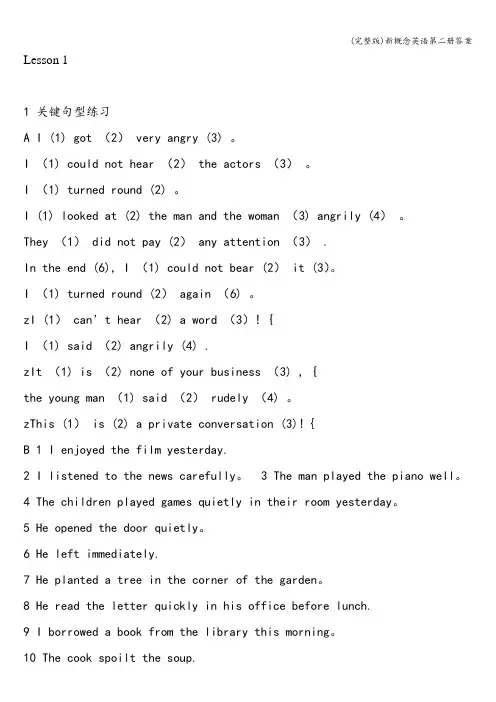
Lesson 11 关键句型练习A I (1) got (2) very angry (3) 。
I (1) could not hear (2) the actors (3)。
I (1) turned round (2) 。
I (1) looked at (2) the man and the woman (3) angrily (4)。
They (1) did not pay (2) any attention (3) .In the end (6), I (1) could not bear (2) it (3)。
I (1) turned round (2) again (6) 。
zI (1)can’t hear (2) a word (3)! {I (1) said (2) angrily (4) .zIt (1) is (2) none of your business (3) , {the young man (1) said (2) rudely (4) 。
zThis (1) is (2) a private conversation (3)!{B 1 I enjoyed the film yesterday.2 I listened to the news carefully。
3 The man played the piano well。
4 The children played games quietly in their room yesterday。
5 He opened the door quietly。
6 He left immediately.7 He planted a tree in the corner of the garden。
8 He read the letter quickly in his office before lunch.9 I borrowed a book from the library this morning。
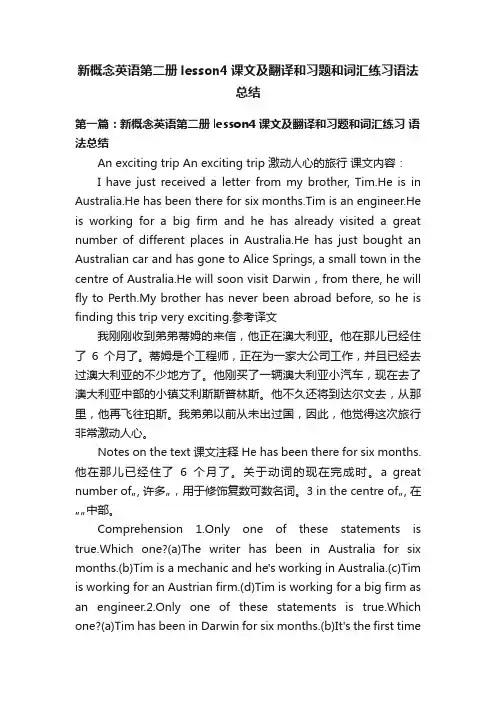
新概念英语第二册lesson4课文及翻译和习题和词汇练习语法总结第一篇:新概念英语第二册lesson4 课文及翻译和习题和词汇练习语法总结An exciting trip An exciting trip 激动人心的旅行课文内容:I have just received a letter from my brother, Tim.He is in Australia.He has been there for six months.Tim is an engineer.He is working for a big firm and he has already visited a great number of different places in Australia.He has just bought an Australian car and has gone to Alice Springs, a small town in the centre of Australia.He will soon visit Darwin,from there, he will fly to Perth.My brother has never been abroad before, so he is finding this trip very exciting.参考译文我刚刚收到弟弟蒂姆的来信,他正在澳大利亚。
他在那儿已经住了6个月了。
蒂姆是个工程师,正在为一家大公司工作,并且已经去过澳大利亚的不少地方了。
他刚买了一辆澳大利亚小汽车,现在去了澳大利亚中部的小镇艾利斯斯普林斯。
他不久还将到达尔文去,从那里,他再飞往珀斯。
我弟弟以前从未出过国,因此,他觉得这次旅行非常激动人心。
Notes on the text 课文注释 He has been there for six months.他在那儿已经住了6个月了。
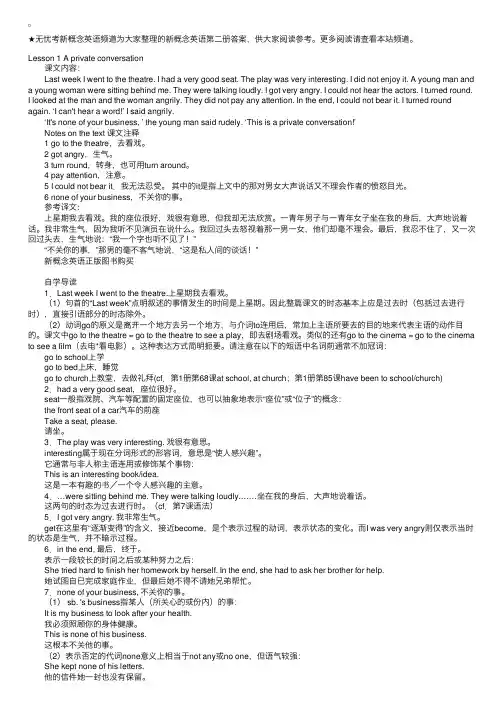
★⽆忧考新概念英语频道为⼤家整理的新概念英语第⼆册答案,供⼤家阅读参考。
更多阅读请查看本站频道。
Lesson 1 A private conversation 课⽂内容: Last week I went to the theatre. I had a very good seat. The play was very interesting. I did not enjoy it. A young man and a young woman were sitting behind me. They were talking loudly. I got very angry. I could not hear the actors. I turned round.I looked at the man and the woman angrily. They did not pay any attention. In the end, I could not bear it. I turned round again. ‘I can't hear a word!’ I said angrily. ‘It's none of your business, ’ the young man said rudely. ‘This is a private conversation!’ Notes on the text 课⽂注释 1 go to the theatre,去看戏。
2 got angry,⽣⽓。
3 turn round,转⾝,也可⽤turn around。
4 pay attention,注意。
5 I could not bear it.我⽆法忍受。
其中的it是指上⽂中的那对男⼥⼤声说话⼜不理会作者的愤怒⽬光。
6 none of your business,不关你的事。
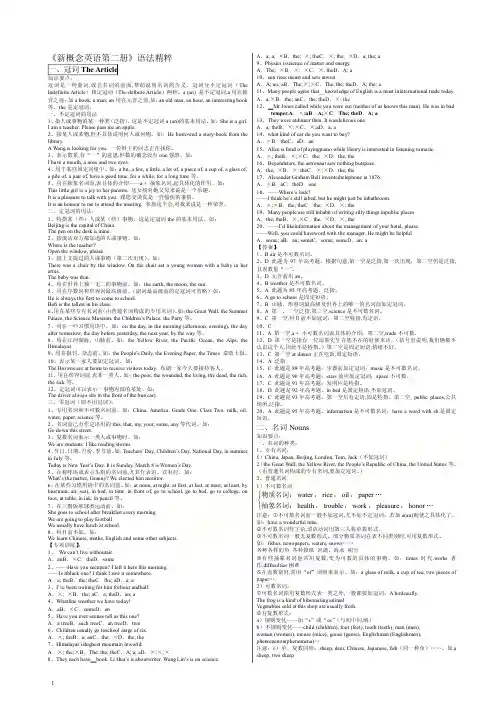
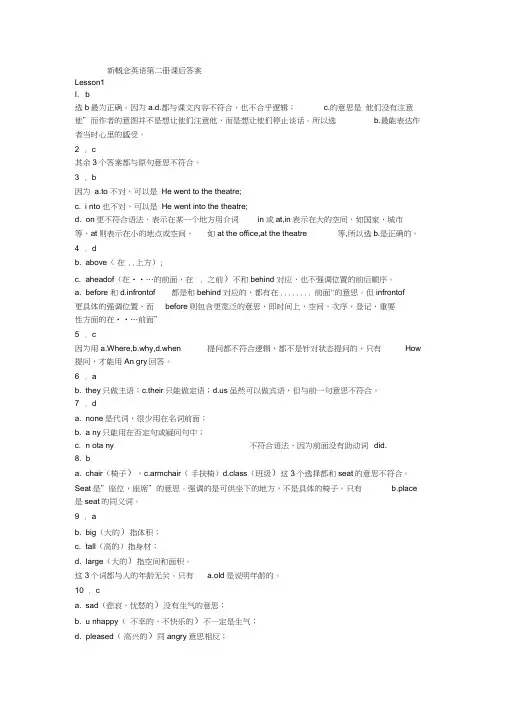
Lesson1I. b选b最为正确。
因为a.d.都与课文内容不符合,也不合乎逻辑; c.的意思是他们没有注意他”而作者的意图并不是想让他们注意他,而是想让他们停止谈话。
所以选 b.最能表达作者当时心里的感受。
2 . c其余3个答案都与原句意思不符合。
3 . b因为 a.to 不对,可以是He went to the theatre;c. i nto 也不对,可以是He went into the theatre;d. on更不符合语法,表示在某一个地方用介词in或at,in表示在大的空间,如国家,城市等,at则表示在小的地点或空间,如at the office,at the theatre 等,所以选b.是正确的。
4 . db. above(在..上方);c. aheadof(在••…的前面,在. 之前)不和behind 对应,也不强调位置的前后顺序。
a. before 和d.infrontof 都是和behind 对应的,都有在........ 前面"的意思。
但infrontof更具体的强调位置,而before则包含更宽泛的意思,即时间上,空间,次序,登记,重要性方面的在••…前面”5 . c因为用a.Where,b.why,d.when 提问都不符合逻辑,都不是针对状态提问的,只有How 提问,才能用An gry回答。
6 . ab. they只做主语;c.their只能做定语;虽然可以做宾语,但与前一句意思不符合。
7 . da. none是代词,很少用在名词前面;b. a ny只能用在否定句或疑问句中;c. n ota ny 不符合语法,因为前面没有助动词did.8. ba. chair(椅子),c.armchair(手扶椅)d.class(班级)这3个选择都和seat的意思不符合。
Seat是”座位,座席”的意思。
强调的是可供坐下的地方,不是具体的椅子。
只有b.place 是seat的同义词。
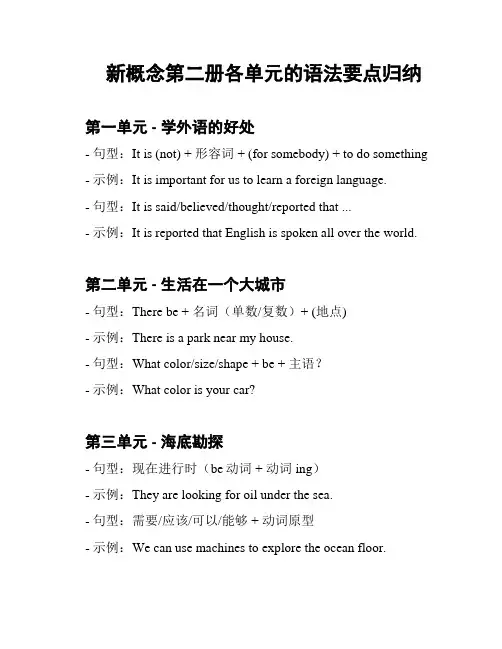
新概念第二册各单元的语法要点归纳第一单元 - 学外语的好处- 句型:It is (not) + 形容词 + (for somebody) + to do something - 示例:It is important for us to learn a foreign language.- 句型:It is said/believed/thought/reported that ...- 示例:It is reported that English is spoken all over the world.第二单元 - 生活在一个大城市- 句型:There be + 名词(单数/复数)+ (地点)- 示例:There is a park near my house.- 句型:What color/size/shape + be + 主语?- 示例:What color is your car?第三单元 - 海底勘探- 句型:现在进行时(be动词 + 动词ing)- 示例:They are looking for oil under the sea.- 句型:需要/应该/可以/能够 + 动词原型- 示例:We can use machines to explore the ocean floor.第四单元 - 名人的生活- 句型:情态动词 + 动词原型- 示例:She can sing very well.- 句型:主语 + be + 形容词 + to do something- 示例:Be patient to wait for your turn.第五单元 - 健康与健身- 句型:情态动词 + 动词原型- 示例:You should exercise regularly.- 句型:主语 + need(s) + to do something- 示例:We need to eat a balanced diet.第六单元 - 书信写作- 句型:谓语动词 + 宾语 + 动词-ing- 示例:I enjoy reading books.- 句型:It is + adj. + of + somebody + to do something - 示例:It is kind of you to help me.第七单元 - 未来生活- 句型:将来时态(will/shall + 动词原型)- 示例:We will have robots to do household chores.- 句型:It is + adj. + that + 从句- 示例:It is certain that technology will change our lives.第八单元 - 代购- 句型:情态动词 + be + adj. + to do something- 示例:I must be careful not to buy counterfeit products. - 句型:主语 + be + 形容词 + of + 宾语- 示例:The article is full of useful information.第九单元 - 旅游- 句型:现在完成时态(have/has + 过去分词)- 示例:I have visited many cities in Europe.- 句型:It is + adj./adv. + that + 从句- 示例:It is true that travel broadens the mind.。
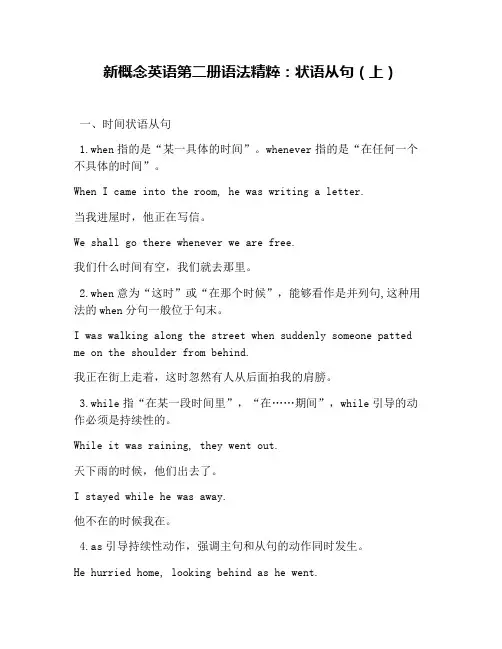
新概念英语第二册语法精粹:状语从句(上)一、时间状语从句1.when指的是“某一具体的时间”。
whenever指的是“在任何一个不具体的时间”。
When I came into the room, he was writing a letter.当我进屋时,他正在写信。
We shall go there whenever we are free.我们什么时间有空,我们就去那里。
2.when意为“这时”或“在那个时候”,能够看作是并列句,这种用法的when分句一般位于句末。
I was walking along the street when suddenly someone patted me on the shoulder from behind.我正在街上走着,这时忽然有人从后面拍我的肩膀。
3.while指“在某一段时间里”,“在……期间”,while引导的动作必须是持续性的。
While it was raining, they went out.天下雨的时候,他们出去了。
I stayed while he was away.他不在的时候我在。
4.as引导持续性动作,强调主句和从句的动作同时发生。
He hurried home, looking behind as he went.他赶快回家,不时地一边走一边向后看。
5.before译为在……之前Be a pupil before you become a teacher.先做学生,再做先生。
6.after译为在……之后He arrived after the game started.比赛开始后,他到了。
7.如主句动词是持续性动作,常用肯定式,表示“直到……为止”。
从属连词为till/untilWe waited till (until) he came back .我们一直等到他回来。
8.如主句动词是瞬间动词,常用否定式,表示“直……才”“在……以前不”,从句放在句首表示强调,一般用untilShe didn’t stop working until eleven o’clock.她到11点钟才停止工作。
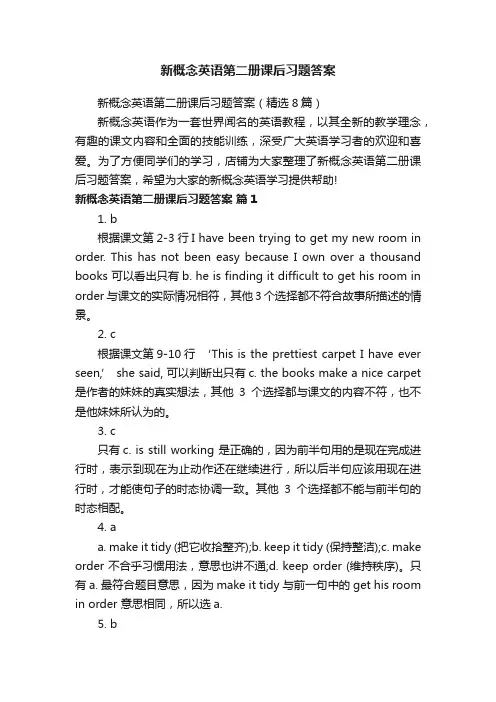
新概念英语第二册课后习题答案新概念英语第二册课后习题答案(精选8篇)新概念英语作为一套世界闻名的英语教程,以其全新的教学理念,有趣的课文内容和全面的技能训练,深受广大英语学习者的欢迎和喜爱。
为了方便同学们的学习,店铺为大家整理了新概念英语第二册课后习题答案,希望为大家的新概念英语学习提供帮助!新概念英语第二册课后习题答案篇11. b根据课文第2-3行I have been trying to get my new room in order. This has not been easy because I own over a thousand books 可以看出只有b. he is finding it difficult to get his room in order 与课文的实际情况相符,其他3个选择都不符合故事所描述的情景。
2. c根据课文第9-10行‘This is the prettiest carpet I have ever seen,’ she said, 可以判断出只有c. the books make a nice carpet 是作者的妹妹的真实想法,其他3个选择都与课文的内容不符,也不是他妹妹所认为的。
3. c只有c. is still working 是正确的,因为前半句用的是现在完成进行时,表示到现在为止动作还在继续进行,所以后半句应该用现在进行时,才能使句子的时态协调一致。
其他3个选择都不能与前半句的时态相配。
4. aa. make it tidy (把它收拾整齐);b. keep it tidy (保持整洁);c. make order 不合乎习惯用法,意思也讲不通;d. keep order (维持秩序)。
只有a. 最符合题目意思,因为make it tidy 与前一句中的get his room in order 意思相同,所以选a.5. ba. a small enough 不合乎语法,不能说a small enough room,可以是 the room is small enough.b. a fairly small(相当小的),c. a terribly small(极小的),d. a much smaller(更加小的),4个选择中只有b 是正确的,因为b中的fairly 同前一句的rather(相当)意义相同,所以b是对的。
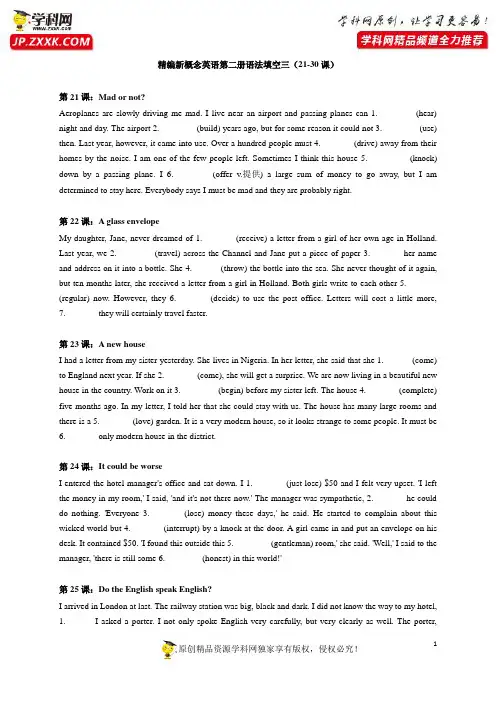
精编新概念英语第二册语法填空三(21-30课)第21课:Mad or not?Aeroplanes are slowly driving me mad. I live near an airport and passing planes can 1.________ (hear) night and day. The airport 2.________ (build) years ago, but for some reason it could not 3.________ (use) then. Last year, however, it came into use. Over a hundred people must 4._______ (drive) away from their homes by the noise. I am one of the few people left. Sometimes I think this house 5._________ (knock) down by a passing plane. I 6.________ (offer v.提供) a large sum of money to go away, but I am determined to stay here. Everybody says I must be mad and they are probably right.第22课:A glass envelopeMy daughter, Jane, never dreamed of 1._______ (receive) a letter from a girl of her own age in Holland. Last year, we 2.________ (travel) across the Channel and Jane put a piece of paper 3._______ her name and address on it into a bottle. She 4.______ (throw) the bottle into the sea. She never thought of it again, but ten months later, she received a letter from a girl in Holland. Both girls write to each other 5._______ (regular) now. However, they 6._______ (decide) to use the post office. Letters will cost a little more, 7._______ they will certainly travel faster.第23课:A new houseI had a letter from my sister yesterday. She lives in Nigeria. In her letter, she said that she 1.______ (come) to England next year. If she 2._______ (come), she will get a surprise. We are now living in a beautiful new house in the country. Work on it 3.________ (begin) before my sister left. The house 4._______ (complete) five months ago. In my letter, I told her that she could stay with us. The house has many large rooms and there is a 5._______ (love) garden. It is a very modern house, so it looks strange to some people. It must be 6._______ only modern house in the district.第24课:It could be worseI entered the hotel manager's office and sat down. I 1._______ (just lose) $50 and I felt very upset. 'I left the money in my room,' I said, 'and it's not there now.' The manager was sympathetic, 2._______ he could do nothing. 'Everyone 3._______ (lose) money these days,' he said. He started to complain about this wicked world but 4._______ (interrupt) by a knock at the door. A girl came in and put an envelope on his desk. It contained $50. 'I found this outside this 5.________ (gentleman) room,' she said. 'Well,' I said to the manager, 'there is still some 6.________ (honest) in this world!'第25课:Do the English speak English?I arrived in London at last. The railway station was big, black and dark. I did not know the way to my hotel,1.______ I asked a porter. I not only spoke English very carefully, but very clearly as well. The porter,2._______, could not understand me. I repeated my question several times and at last he understood. he answered me, but he spoke neither slowly3.______ clearly. 'I am a foreigner,' I said. Then he spoke slowly, but I could not understand him. My teacher never spoke English4.______ that! The porter and I looked at each other and smiled. Then he said something5.______ I understood it. 'You'll soon learn English!' he said.I wonder. In England, each person speaks a different language. The English understand each other, but I don't understand them! Do they speak English?第26课:The best art criticsI am an art student and I paint a lot of pictures. Many people pretend that 1._______ understand modern art. They always tell you 2.________ a picture is 'about'. Of course, many pictures are not 'about' anything. They are just pretty patterns. We like them in the same way that we like pretty curtain material. I think 3.________ young children often appreciate modern pictures better than anyone else. They notice more. My sister is only seven, but she always tells me 4.________ my pictures are good or not. She came into my room yesterday.'What are you doing?' she asked.'I'm hanging this picture on the wall,' I answered. 'It's a new one. Do you like it?'She looked at it 5.________ (critical) for a moment. 'It's all right,' she said, 'but isn't it upside down?'I looked at it again. She was right! It was!第27课:A wet nightLate in the afternoon, the boys put up their tent in the middle of a field. As soon as this 1._______ (do), they cooked a meal over an open fire. They were all hungry and the food smelled good. After a wonderful meal, they told stories and 2._______ (sing) songs by the campfire. But some time later it began to rain. The boys felt tired 3.______ they put out the fire and 4._______ (creep v.爬) into their tent. Their sleeping bags were warm and comfortable, so they all slept soundly. In the middle of the night, two boys 5._______ (wake) up and began shouting. The tent was full of water! They all 6._______ (leap v.跳) out of their sleeping bags and hurried outside. It was raining heavily and they found that a stream 7.________(form) in the field. The stream 8.________ (wind) its way across the field and then flowed right under their tent!第28课:No parkingJasper White is one of those rare people who believes 1._____ ancient myths. He has just bought a new house in the city, but ever since he moved in, he 2._______ (have) trouble with cars and their owners. When he returns home at night, he always finds that someone 3._______ (park) a car outside his gate. Because of this, he has not been able to get his own car into his garage even 4. ______ (one). Jasper has put up 'No Parking' signs outside his gate, 5.______ these have not had any effect. Now he has put an ugly stone head over the gate. It is one of the 6._______ (ugly) faces I have ever seen. I asked him 7.______ it was and he told me that it was Medusa, the Gorgon. Jasper hopes that she 8._______ (turn) cars and their owners to stone. But none of them has been turned to stone yet!第29课:TaxiCaptain Ben Fawcett has bought an 1._______ (usual) taxi and has begun a new service. The 'taxi' is a small Swiss aeroplane called a 'Pilatus Porter'. This wonderful plane can carry seven passengers. The most surprising thing about it, 2._______, is that it can land anywhere: on snow, water, 3.______ even on a ploughed field. Captain Fawcett's first passenger was a doctor who 4.______ (fly) from Birmingham to a lonely village in the Welsh mountains. Since then, Captain Fawcett has flown passengers to many unusual places. Once he landed 5.______ the roof of a block of flats and on another occasion, he landed in a 6._______ (desert) car park. Captain Fawcett has just refused a strange request 7._______ a businessman. The man wanted to fly to Rockall, a lonely island in the Atlantic Ocean, but Captain Fawcett did not take him 8._______ the trip was too dangerous.第30课:Football or polo?The Wayle is a small river that 1._______ (cut) across the park near my home. I like sitting by the Wayle 2._______ fine afternoons. It was warm last Sunday, so I went and sat on the river bank as usual. Some children 3.________ (play) games on the bank and there were some people 4.________ (row) on the river. Suddenly, one of the children kicked a ball very hard and it went 5.________ a passing boat. Some people on the bank called out to the man in the boat, 6.______ he did not hear them. The ball struck him so hard 7._______ he nearly fell into the water. I turned to look at the children, but there weren't any 8.______ sight: they had all run away! The man laughed when he realized what 9._______ (happen). He called out to the children and threw the ball back to the bank.答案及解析第21课:Mad or not?答案:1. be heard2. was built3. be used4. have been driven5. be knocked6. have been offered 解析:1.“经过的飞机能够被听见”,所以用被动。
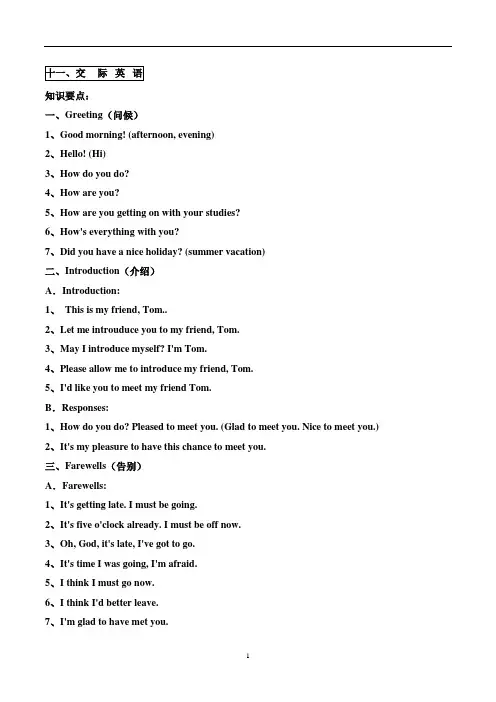
知识要点:一、Greeting(问候)1、Good morning! (afternoon, evening)2、Hello! (Hi)3、How do you do?4、How are you?5、How are you getting on with your studies?6、How's everything with you?7、Did you have a nice holiday? (summer vacation)二、Introduction(介绍)A.Introduction:1、This is my friend, Tom..2、Let me introuduce you to my friend, Tom.3、May I introduce myself? I'm Tom.4、Please allow me to introduce my friend, Tom.5、I'd like you to meet my friend Tom.B.Responses:1、How do you do? Pleased to meet you. (Glad to meet you. Nice to meet you.)2、It's my pleasure to have this chance to meet you.三、Farewells(告别)A.Farewells:1、It's getting late. I must be going.2、It's five o'clock already. I must be off now.3、Oh, God, it's late, I've got to go.4、It's time I was going, I'm afraid.5、I think I must go now.6、I think I'd better leave.7、I'm glad to have met you.1、Come again whenever you are free.2、If you pass my home, drop in.3、Good night, have a nice dream.4、Can't you stay a little longer?5、I hope we'll meet again sometime.四、Asking and Directing the Way(问路和指路)A.Asking the way:1、Can you tell me the way to the post office?2、Is this the way to the post office?3、Excuse me, how can I get to the post office?4、Which is the nearest way to the post office?5、Is the post office far from here?6、How long will it take me to get to the post office?7、Excuse me, is there a post office near here?8、Excuse me, does this bus go to the post office? B.Responses:1、Go ahead till you come to the next crossing.2、No, it's not far from here. It's only about ten minutes' walk.3、It's about 200 yards down the street.4、Take Bus No. 3 and it will take you right there.5、Go down the street and take the second turning on the left.五、Asking for Time and Date(询问时间与日期)A.Asking:1、What time is it now?2、What's the time by your watch?3、What day is it today?4、What is the date today?5、Is your watch correct?1、It's ten.2、It's Wednesday.3、It's October, 8th.4、My watch says it's 7:30.5、My watch always keeps good time.六、Asking about Health(询问健康)A.Asking:1、How are you these days?2、What's wrong with you?3、Have you seen the doctor?4、You look tired. What's wrong?B.Responses:1、I'm not quite myself today.2、My stomach hurts3、I don't feel like eating anything today.4、I've got a bad cold.七、Talking about Weather(谈论天气)1、It's a fine day, isn't it?2、What's the temperature today?3、What's the weather like today?4、How is the weather?5、What's the weather going to be like at the weekend?6、Do you like the weather in Beijing?7、Do you think that we are going to have snow today?八、Invitations(邀请)A.Invitations:1、Would you like to come to my birthday party?2、Will you be able to come to my birthday party?3、I'd be very glad if you would come to my birthday party.4、Can you fix a time for a picnic?5、Are you free tomorrow? What (How) about having a picnic?6、Won't you come with me?7、You will come to have dinner with me, won't you? B.Responses:1、I'd be glad to, thank you.2、It's very kind of you to invite me.3、I'd like to, but I'm too busy.4、Thank you for your kind invitation, I will.5、I'm afraid not. I will have to look after my sick mother.6、I'm sorry, I can't. Thank you very much.九、Making an Appointment(约会)A.Making an appointment:1、Are you free this afternoon?2、How about tomorrow evening?3、Shall we meet at 7:00 at the gate of the cinema?4、When will you be able to see us?5、What time can I call on you?6、Will you be at home next Sunday?7、Don't forget to come to my birthday party. B.Responses:1、Tomorrow evening will be all right.2、Yes, I'll be free then.3、No, I won't be free then, but I'll be free next Wednesday.十、Making a phone call(打电话)A.Making a call:1、Hello, is Mary in?2、Hello, is that Mary speaking?3、Can I have your telephone number, please?4、Hello, may I speak to Mary?5、Could you ask him to call me, please?6、Who is it, please?B.Responses:1、This is Mary speaking.2、Hold on please.3、Mary, you are wanted on the phone.4、Mary isn't here right now. Can I take a message for you? 十一、Shopping(购物)A.Shop assistant:1、What can I do for you?2、Can (May) I help you?3、How much do you want?4、What about this (these)?B.Customer:1、I'd like to have a look at the sweater.2、That's too expensive (dear), I'm afraid.3、That's fine. I'll take it.4、How much is it?十二、Seeing the Doctor(看病)A.Doctor:1、What's wrong (the matter) with you?2、How long have you been like this?3、Let me examine you.4、Take this medicine three times a day.5、Drink plenty of water and take a good rest.6、It's nothing serious. Take it easy.B.Patient:1、There's something wrong with my stomach.2、I've got a pain here.3、I feel terrible (sick).4、This place hurts.5、I don't feel like eating anything.十三、Requests and Offers(请求与提供帮助)A.Requests:1、Can (could) you do something for me?2、Will (would) you do something for me?3、May I have some ice—cream?4、Please do me a favor.5、Please don't open the window.6、Do (Would) you mind turning down the radio?7、I wonder if you could lend me some money. B.Offers:1、Can (Shall) I help you?2、What can I do for you?3、Is there anything (else) I can do for you?4、Would you like me to do this for you?5、Would you like some help?十四、Asking for Permission(请求允许)A.Ask for permission:1、May I park my car here?2、Can (Could) I smoke in this room?3、Do (Would) you mind if I smoke (smoked) here?4、I wonder if I could smoke here. B.Responses:1、Certainly. (sure, of course), go ahead2、Yes, please.3、All right (OK).4、I'm sorry, it's not allowed.5、I'm afraid not.十五、Advice and Suggestions(劝告和建议)1、You'd better go to see the doctor.2、You should do it at once.3、Why not go on a picnic next Sunday?4、What (How) about going there by boat?5、Have you considered going there by boat?6、Shall we take a walk after supper?7、I suggest you do more reading.8、I advise you to take more exercises.【专项训练】一、Greeting1、—Hello, Joan.—Kate. Glad to see you.A.Hi B.Hello C.Good morning D.How do you do2、—Hi, haven't seen you for ages! You look fine.—. You look well too.A.Great B.Thanks C.Oh, no D.Not at all3、—How are you! Jane?—A.How are you, Mary? B.Fine, thanks, and you? C.All is right. D.That's good.4、—How do you do?—.A.Very well, thank you. B.Why, yes. I'm fine. C.How do you do? D.What about you?5、—How's everything with you?—.A.Fine, thanks B.It's all right C.Thank very much D.I'm very well6、—How's your work going?—A.Not too well, I'm afraid B.Quite good. What about you?C.Fine, how are you, then? D.Well, thanks a lot.7、—Did you have a good summer holiday?—Yes, thanks. Kate?—She's OK, thanks.A.what's is B.How is C.What's wrong D.and8、—Glad to meet you again. How are you?—I'm just .(老样子)A.my old self B.old myself C.myself old D.as old myself9、—It's nice to see you in New York. How's your family?—. My wife asked me to say hello to you.A.It's very well B.They are fine C.That's all right D.They are good10、—How's the young man?—.A.He's twenty B.He's a doctor C.He's much better D.He's David11、—How on with your new job these days?—Not bad.A.do you get B.did you get C.are you getting D.have you getting12、—Hello, Kate! Fancy meeting you here! Working again, are you?—Yes, , if I want to pass the exams.A.I've got to B.no other way C.I must do D.I have on way13、In the evening you meet your foreign teacher walking towards the reataurant, you should say .A.Good evening. B.Good night. C.Hello. Have you had your supper? D.Hi! Going to dinner.二、Introduction1、—Hi, Tom, this is my friend John.—A.Nice to meet you. B.How are you? C.Hi, Tom, I'm John. D.Are you Tom?2、—Let me introduce myself. I'm Albert.—.A.With a pleasure B.It's my pleasure C.I'm very pleased D.Pleased to meet you3、When you are introduced to someone, you should sayA.I'm getting on well B.I love you very much C.Fine, thank you. D.How do you do?4、—Have you met my girl friend, Susan? Susan, this is Li.—A.Glad to meet you. B.Thank you. C.How are you? D.Welcome home.5、—Please allow me to introuduce Mr. Smith, director of the department.—(久仰大名)A.I haven't seen you before. B.Haven't we met before?C.I've heard so much about you. D.How do you do?6、If Mr. Baker is here, will please make to me?A.you, yourself know B.you, you know C.he, us know D.he, himself know7、Let's give him a .A.warm welcome B.warming welcome C.warmly welcome D.warm welcoming三、Farewells1、—It's five o'clock already, I must be going.—Well, come again you are free.A.if B.whenever C.when D.while2、—Oh, God, it's late. I've got to go.—. Hope to see them soon.A.Give your parents my greetings B.Remember me to your parentsC.Show my greetings to your parents D.Say hello to your parents3、—It's time I was going, I'm afraid.—.A.Good evening B.Good night C.Bey—bey D.All the best4、—Well, I'd better let you get on with your work.—.A.I've wasted a lot of your time B.Thank you for a lovely afternoonC.You must be tired D.I'm sorry to trouble you5、—I'm flying home on Sunday morning.—I wish you .A.a pleasant journey home B.a good trip C.good lucky D.a happy journey travel6、—I think I must go now. See you later.—.A.You can go B.See you later C.Bye—bye D.So long7、—I'm glad to have met you. Drop by sometime.—.A.Thank you B.Give me a call C.Thanks, I certainly will D.Take care8、—It's very kind of you to come and see me off.—.A.It's my pleasure B.much better C.Don't say it D.No problem9、—I'm going camping this weekend.—.A.Can you fish? B.Have a good time C.No, I'm too busy D.Don't give up now10、—I'll go to Beijing this weekend..A.You are lucky B.The best of luck C.Thank you D.Good—bye四、Asking and Directing the Way1、—Excuse me, can you tell me where the nearest bus stop is?—I'm sorry, I have no idea. I .A.don't know B.am a strager here C.am new D.just come2、—will it take me to walk there?—About ten minutes.A.How far B.How long C.How much D.What far3、—Excuse me, is there a cinema around here?—Yes, please go , then turn right the first crossing.A.before, on B.ahead, at C.along, of D.forward, to4、—Excuse me, officer. I can't find the subway entrance.—See those glass doors? Go in and you will see it on your right.A.Can you help me? B.Where is it?C.Show me the way? D.You are very helpful5、—Is your school far from here?—Not very far, .A.it is about ten minutes' walk B.it nees to walk ten minutesC.you need walking ten minutes D.it is about ten—minutes walk6、—Could you tell me where the train station is?—.A.It's over there B.It's on the third floor C.No, I know little D.Yes, it's there7、—Excuse me, is this Mr. Brown's office?—I'm sorry, but Mr. Brown works here.A.not now B.no more C.not still D.no longer8、—Excuse me, can you tell me the way to the Sleeping Beauty Castle?—Yes, .A.Go down this road B.Go ahead till you see the entranceC.It's not far from here D.You can walk there五、Asking for Time and Date1、—?—It's the third of May?A.What day is it B.What's the date C.What's the time D.What's the clock2、—?—I'm sorry, my watch has stopped.A.When is it B.How much is it C.What is the time D.What's the clock3、—Is your watch right?—I think so. I set it the radio this morning.A.to B.of C.by D.through4、—What day is it today?—.A.July 27 B.Saturday C.the 27 of July D.Women's Day5、—How long has this bookshop been in business?—1982.A.After B.In C.From D.Since6、—When are you off?—at 21:24.—I hope you will have a good flight.A.My bus leaves B.My plane takes of C.My train goes D.My coach goes7、—will the work be ready?—two months.A.How long, AfterB.How often, For C.How soon, In D.How much, During8、—Is your watch correct?—Yes, my watch .A.runs well B.keeps good time C.keeps right D.never stops六、Asking about Health1、—How's your brother these days?—He hasn't been to well.—What's the matter?A.It's bad. B.I'm sorry to here that. C.Very badly. D.Why?2、—I haven't seen Bob lately.—As a matter of fact, he is ill.A.Where is he? B.Why? C.How is he? D.What does he do?3、—You sound as if you've got a cold. .—.—Get a good rest.A.Yes, as if B.I've been over—working C.I don't think so D.I hope not4、—I'm afraid I've got a bad cold.—.A.Never mind B.Keep away from meC.Better go and see a doctor D.You need to take medicine5、—John has caught a bad cold.—.A.It's too bad B.I don't believe it C.I'm sorry to hear that D.Take it easy6、—, Wang?—I've got a headache and I feel chilly.A.What's wrong B.What the matter is C.What is matter D.How about you7、—My stomach hurts. I feel sick.—For safety's sake, .A.go to see a doctor tomorrow B.Better to go to hospitalC.you'd better see a doctor at once D.Quick go to hospital七、Talking about Weather1、—It seems to be clearing up.—That will be a nice change, ?A.isn't it B.won't it C.can't it D.doesn't it2、—How cold is it today?—.A.Just so—so B.not too C.It's ten below zero D.Yes, it is3、—?—It's very cold and damp.A.What's the weather B.How's the weather todayC.Is it raining last night D.Might it have rained a lot4、—Do you like the weather in North China?—Not really, but now.A.I fit it B.I am used to it C.I used to it D.I agree to it5、—I wonder what the weather is going to be like tomorrow?—.—That's a good idea.A.Let's look through the paper B.Let's listen to the weather report on the radio C.Better be care of the radio D.Pay attention to the radio6、—.—It certainly is. The sun is shining and there is a pleasant breeze.—It's lovely.A.What nice it is B.How nice it is here C.It is like spring here D.What a good day here7、—What a nice day, isn't it?—A.You're right. B.Yes, isn't it? C.Yes, I agree. D.Really?8、—?—Yes, a bit cold, though.A.Cold weather, isn't it B.Bad weather, don't you thinkC.Freezing, isn't it D.Nice day, isn't it9、—today?—It's nice and warm.A.What's the weather B.What's the weather likeC.How is the weather like D.How does the weather look like10、—Do you think it is going to snow over the weekend?—.A.I don't believe B.I don't believe it C.I believe not so D.I believe not八、Invitations1、—Would you like to come around for a meal on my birthday?—Oh, yes. Thank you very much.A.When is your birthday? B.What day is your birthday?C.When were you born? D.What time is your birthday?2、—Have you got anything to do tomorrow?—.A.Yes, a lot of B.No, I won't be busy C.Certainly have D.Oh, that's a pity3、—Would you like to come to the cinema, Frank?—I have to do my homework.A.I don't, I'm afraid. B.I can't, I'm afraid. C.I'm sorry. D.Oh, pity!4、—Helen, I'd be glad if you would come and have tea with us on Friday.—.A.I try to go B.Many thanks for your kind invitation, I willC.I am very busy D.I must go5、—How about going to "Grand" for dinner?—. It's a long time since we had a good meal.A.wellB.That sounds like a good ideaC.Thank youD.But I'm too busy6、—Do you have to go? Can't you stay and have a meal?—I really think I must be off now.A.I'd love to, but B.Yes, I mustC.No, I don't have to but D.Yes, I can, but7、—Would you like to come to the party tomorrow?—.A.I'd like B.I like it C.I'd like to D.I'd like it8、—Will you be able to come and see us on Friday?—. I will have to work.A.I believe yes B.I don't hope so C.I won't be able to D.I'm afraid not9、—Shall I call for you of will you call for me?—You'd better come for me, ?A.can you B.OK C.really D.would you10、—Would you like to come to dinner tonight?—I'd like to, I'm too busy.A.and B.so C.as D.but九、Making an Appointment1、—Good morning, I'd like to see Mr. Baker, please.—Mr. Baker is quite busy. .A.You can't see him B.You won't be able to see him C.I'm afraid you won't be able to see him today. D.Please come next time.2、—Will you be able to come to see us sometime next month?—.A.I believe yes B.I don't hope so C.I won't be able to D.I'm afraid not3、—When will you be free this month, Mr. Smith?—, maybe we'll be free next Sunday.A.Let me be B.Let me see C.I'm afraid D.Think it over4、—What time can I call on you?—Any time this evening will be .A.OK B.right C.good D.free5、—I'm sorry to say that I can't come to your party tonight.—? Haven't we agreed on?A.What is it B.What is it now C.How is it D.What do you think6、—I have an appointment with Mr. Black. My name is John Brown.—Ah, yes, your appointment is at 4:15. , please, Mr. Brown?A.Wait a minute B.May you wait C.Can you wait a minute D.Take it easy7、—I'm sorry to keep you waiting.—Oh, not at all. I here only a few minutes.A.have been B.had been C.was D.will be8、—I'll come back tomorrow evening at nine. Can you meet me at the airport?—.A.All right B.All right. Nice to see you C.OK, wait for me D.All right. See you then9、—Will you be at home next Sunday?—A.Yes, but why? B.No, never mind. C.Not at all. D.Yes, of course not.10、—Don't forget to come to my birthday party tomorrow.—.A.I don't B.I won't C.I can't D.I haven't十、Making a phone call1、—Hello, is Henry in?—I'm sorry, he isn't here. ?A.What's the matter B.May I help you C.Is there anything D.Who are you2、—Could you ask him to call me, please?—! What's your name, please?A.S ure B.Oh C.Yes D.Well3、—?—Sure, it's 65250786.A.What's your telephone number B.Can I have your telephone numberC.Can I help you D.Can you make your telephone number4、The operator put him to 65250786.A.over B.on C.through D.in5、—Would you please tell John I called?—, please.A.Hold on B.Hold up C.Hold over D.Hold out6、—Is this number 61234567?—.A.No, you are wrong B.Sorry, you've got the wrong phoneC.No, you've dialed the wrong number D.No, you are right7、—Hello. May I speak to Zhou Lan?—Yes. .A.My name is Zhou Lan B.I'm Zhou Lan C.This is Zhou Lan speaking D.Zhou Lan's me8、—Do you want to have a message?—No, thanks. I in half an hour.A.will call again B.can call C.may phone him D.would call十一、Shopping1、—I'd like to buy a ten—speed bicycle.—How about this kind of type?—?A.How many is it B.How is it C.How much is it D.How expensive is2、—do you want?—Half a kilo, please.A.How many apples B.What are apples C.How many apple D.How much apples3、—What's the problem?—I'm afraid . It's a size 12 and it's too small.A.it don't suit B.it isn't fit C.it doesn't fit D.it isn't suit4、—How much is the blue skirt?—Ten dollars.A.How many size do you want? B.What size do you take?C.How large do you want? D.What size do you dress?5、—What about the dark blue sweater?—I like it, but it . You decide.A.costs too much B.take too much C.cost too many D.spends too much6、—Would you mind if I looked at some of your tape recorders?—.A.I'd better to see what the boss has to say about it B.Not at all, sir. Go right ahead C.Thank you for your coming D.Yes, do that, sir7、—Do you think the shirt really fits me?—. It goes well with your tie, too.A.Of course it does B.Yes, it does C.I am not sure D.Perhaps it does8、—Shall I ask the shop keeper if I can .—OK. And we'd better ask Mom whether it's cheap enough.A.take it on B.try it on C.wear D.put it on9、—How much did you the dress?—We 210 yuan for it.A.spend, pay for B.pay for, cost for C.pay for, paid D.take, pay十二、Seeing the Doctor1、—Well, ?—I feel hot and feverish.A.how do you feel like B.what's the matter with youC.what do you feel D.what illness do you have2、—?—Yes, I have. My temperature seems all right.A.Do you know your temperature B.Have you taken your temperatureC.Have you had your temperature D.Do you have your temperature3、—Oh, doctor. Are you sure it's nothing serious?—Yes, . I'm sure of that.A.he'll well soon B.he can be right quicklyC.he'll be all right soon D.he'll be good soon4、—You haven't had your lunch?—I had a little, but .A.I didn't feel like eating B.I didn't feel like to eatC.I didn't like to eating D.I didn't want to eating5、—?—I'm feeling even worse after taking the medicine.A.Are you feeling better B.How are you feelingC.How are you getting on D.How are you going6、—How about your headache now?—I can't get rid of it. I don't know what's the matter.—Take it easy. .—Thank you, doctor.A.Take this medicine before you go to bed B.Drink plenty of water and take a good restC.Take this medicine a day three times D.Go home and lie in bed for a good rest7、—My whole body feels weak and I've got a headache.—?A.How long ago did you get it this B.How long have you been like thisC.How soon have you got it D.How soon have you liked this十三、Requests and Offers1、—Can I count on you for help?—A.As you like. B.I'm sorry. C.Yes, you certainly can D.Why do you ask?2、—Could you spare me some ink?—.A.Yes, of course B.Not at all C.Yes, I cold D.Never mind3、—Let me help you carry the box.—No, I can manage, but .A.not at all B.it doesn't matter C.thank you just the same D.the same to you4、—Will you make me a kite?—.A.I'm glad B.I'll be glad C.I'm going to glad D.I'll be glad to5、—You seem to get lost. Need help?—A.Yes, would you help me with the bag? B.Yes, take me please.C.Help me find the key, please. D.I'm looking for Shanghai Road.6、—I'll be away on a business trip. Would you mind looking after my cat?—Not at all. .A.I've no time B.I'd rather not C.I'd like it D.I'd be happy to7、If you want to ask someone for help, which drills shouldn't you say ?A.Could you do me a favor B.Would you do me a favorC.May I ask a favor of you D.Can you give me a help8、—Can I have some meat?—Certainly, just .A.take it as you like B.eat it as you pleaseC.help yourself D.help yourself at home十四、Asking for Permission1、—Would you mind if I played the violin here?—.A.No, you won't B.No, do as you pleaseC.Yes, I don't mind D.Yes, do as you please2、—May I stop here?—No, you .A.mustn't B.might not C.needn't D.won't3、—Shall I tell John about it?—No, you . I've told him already.A.needn't B.wouldn't C.mustn't D.shouldn't4、—Can I use your tape recorder for a while?—Yes, .A.go ahead B.you can't broke it C.all right D.no, sorry5、? I didn't quite catch you.A.Will you please repeat it again B.PardonC.What did you say D.Say it again now6、Dick wants to go to the toilet during the class. He puts up his hand and says to his teacher:A.Excuse me, I can't stand any longer. B.Will you please let me go?C.Please, sir, may I be excused? D.I must go outside.7、—Can I go and have a look at it?—Yes, of course. .A.After me B.Come this way C.You may look D.This direction十五、Advice and Suggestions1、—I usually go there by train.—Why not by boat for a change?A.to try going B.trying to go C.to try and go D.try going2、—I'd like information about the management of your hotel.—Well, you could have word with the manager, he might be helpful A.some, a B.an, some C.some, some D.an, a3、—I'm afraid I've got a bad cold.—.A.Never mind B.Keep away from the medicineC.Better go and see a doctor D.You need take a medicine4、—I can't see the words on the blackboard.—Perhaps you need .A.to examine your eyes B.to have your eyes examined C.to have examined your eyes D.your eyes to be examined5、—Let's go and see our teacher on Teachers' Day.A.That's will do B.That's allC.That's all right D.All right【答案】一、Greetings:1、B2、B3、B4、C5、A6、B7、B8、A9、B 10、C11、C 12、A 13、A二、Introduction:1、A2、D3、D4、A5、C6、D7、A三、Farewells:1、B2、D3、B4、B5、A6、B7、C8、A9、B 10、B四、Asking and Directing the Way:1、B2、B3、B4、A5、A6、A7、D8、B五、Asking for Time and Date:1、B2、C3、C4、B5、D6、B7、C8、B六、Asking about Health:1、B2、C3、B4、C5、C6、A7、C七、Talking about Weather:1、B2、C3、B4、B5、B6、B7、B8、D9、B 10、D八、Invitation:1、B2、B3、B4、B5、B6、A7、C8、D9、B 10、D九、Making an Appointment:1、C2、D3、B4、A5、C6、C7、A8、D9、A 10、B十、Making a Phone Call:1、B2、A3、B4、C5、A6、C7、C8、A十一、Shopping:1、C2、A3、C4、B5、A6、B7、A8、B9、C十二、Seeing the Doctor:1、B2、B3、C4、A5、B6、A7、B十三、Requests and Offers:1、C2、A3、C4、D5、D6、D7、D8、C十四、Asking for Permission:1、B2、A3、A4、A5、B6、C7、B十五、Advice and Suggestions:1、D2、A3、C4、B5、D。
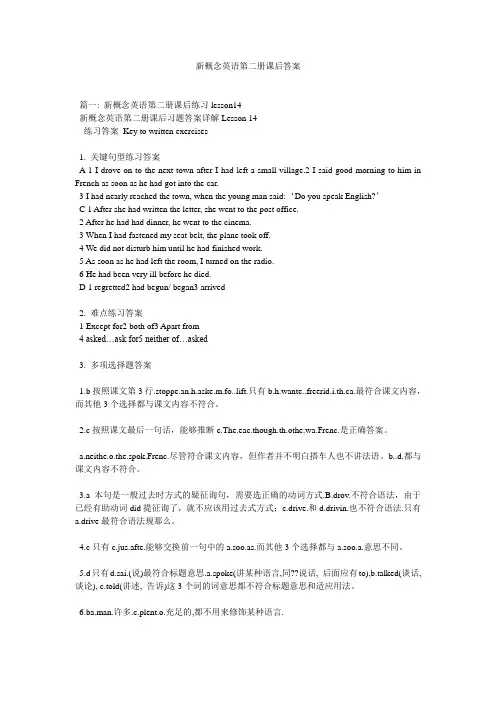
新概念英语第二册课后答案篇一: 新概念英语第二册课后练习lesson14新概念英语第二册课后习题答案详解Lesson 14练习答案Key to written exercises1. 关键句型练习答案A 1 I drove on to the next town after I had left a small village.2 I said good morning to him in French as soon as he had got into the car.3 I had nearly reached the town, when the young man said:‘Do you speak English?’C 1 After she had written the letter, she went to the post office.2 After he had had dinner, he went to the cinema.3 When I had fastened my seat belt, the plane took off.4 We did not disturb him until he had finished work.5 As soon as he had left the room, I turned on the radio.6 He had been very ill before he died.D 1 regretted2 had begun/ began3 arrived2. 难点练习答案1 Except for2 both of3 Apart from4 asked…ask for5 neither of…asked3. 多项选择题答案1.b按照课文第3行.stoppe.an.h.aske.m.fo..lift.只有b.h.wante..freerid.i.th.ca.最符合课文内容,而其他3个选择都与课文内容不符合。
新概念英语第二册课后习题答案详解(整理打印版)Lesson 11.b 选b 最为正确。
因为a.d.都与课文内容不符合,也不合乎逻辑;c.的意思是“他们没有注意他”,而作者的意图并不是想让他们注意他,而是想让他们停止谈话。
所以选 b.最能表达作者当时心里的感受。
2.c 其余3 个答案都与原句意思不符合。
3.b 因为a. to 不对,可以是He went to the theatre;c. into也不对,可以是He went intothe theatre;d. on 更不符合语法,表示在某一个地方用介词in 或at, in表示在大的空间,如国家,城市等,at则表示在小的地点或空间,如atthe office, at the theatre等, 所以选b.是正确的。
4.db. above( 在,, 上方);c. ahead of (在,, 的前面,在,, 之前)不和behind对应,也不强调位置的前后顺序。
a. before和d. infront of都是和behind 对应的,都有“在,,前面”的意思。
但in front of更具体的强调位置,而before 则包含更宽泛的意思,即时间上,空间,次序,登记,重要性方面的“在,, 前面”5.c 因为用a. Where, b. why, d. when提问都不符合逻辑,都不是针对状态提问的,只有How 提问,才能用Angry 回答。
6.ab. they只做主语;c. their 只能做定语;d. us 虽然可以做宾语,但与前一句意思不符合。
7.da. none是代词,很少用在名词前面;b. any只能用在否定句或疑问句中;c. not any不符合语法,因为前面没有助动词did.8.ba. chair( 椅子),c. armchair( 手扶椅) d. class(班级) 这3 个选择都和seat 的意思不符合。
Seat 是”座位,座席”的意思。
强调的是可供坐下的地方,不是具体的椅子。
【专项训练】:1、We can’t live without air.A.an B.×C.the D.some2、——Have you seen pen I left it here this morning.——Is it black one I think I saw it somewhere.A.a; the B.the; the C.the; a D.a; a3、I’ve been waiting for him f or hour and half.A.×; ×B.the; a C.a; the D.an; a4、What fine weather we have today!A.a B.×C.some D.an5、Have you ever seen as tall as this oneA.a tree B.such tree C.an tree D.tree6、Children usually go to school at age of six.A.×; the B.a; an C.the; ×D.the; the7、Himalayas is highest mountain in world.A.×; the;×B.The; the; the C.A; a; a D.×;×;×8、They each have __book. Li Hua’s is about writer. Wang Lin’s is on science.A.a; a; ×B.the; ×; the C.×; the; ×D.a; the; a9、Physics is science of matter and energy.A.The; ×B.×; ×C.×; the D.A; a10、sun rises in east and sets in west.A.A; an; a B.The;×;×C.The; the; the D.A; the; a11、Many people agree that__knowledge of English is a must in international trade today.A.a;×B.the; an C.the; the D.×; the12、__Mr Jones called while you were out (neither of us knows this man). He was in badtemper. A.×;a B.A;×C.The; the D.A; a13、They were at dinner then. It was delicous one.A.a; the B.×;×C.×;a D.a; a14、what kind of car do you want to buyA.×B.the C.a D.an15、Alice is fond of playing piano while Henry is interested in listening to music.A.×; the B.×;×C.the; ×D.the; the16、Beyond stars, the astronaut saw nothing but space.A.the; ×B.×; the C.×;×D.the; the17、Alexander Graham Bell invented telephone in 1876.A.×B.a C.the D.one18、——Where’s Jack——I think he’s still in bed, but he might just be in bathroom.A.×;×B.the; the C.the; ×D.×; the19、Many people are still in habit of writing silly things in public places.A.the; the B.×;×C.the; ×D.×; the20、——I’d like information about the management of your hotel, please.——Well, you could have word with the manager. He might be helpful.A.some; a B.an; some C.some; some D.an; a【答案】:1、B air是不可数名词。
新概念英语第二册语法解析及练习题2020合辑_新概念英语第二册语法解析及练习题1.表示过去所发生的动作对现在的影响或产生的结果。
常与yet,just,before,recently,lately(最近),ever,never等表时间的副词搭配使用。
● He hasn't seen her lately.● I haven't finished the book yet.2.表示一个从过去某个时间开始,延续到现在并可能持续下去的动作,常与表示一段时间的时间状语连用。
如:so far(迄今为止),up till now(直到现在),since, for a long time(很长时间),up to present(直到现在),in the past / inthelast few years(在过去的几年里),these days(目前)。
. He has worked here for 15 years.. I have studied English since I came here.. The foreigner has been away from China for a long time.. So far, I haven't received a single letter from my brother.3.某些非延续性动词(即:动作开始便终止的动词),在现在完成时中不能与表示一段时间状语搭配。
黄金要点:I.常见的非延续动词:die,arrive(到达),join(加入),leave(离开),go, refuse(拒绝),fail(失败),finish,buy,marry,divorce(离婚),awake(醒) ,buy,borrow,lend.(背三遍!)II.这类动词并非不能用现在完成时,而是不能接常由for引导的时间状语。
III.但若是用在否定句中,非延续动词的现在完成时可以与表示一段时间的状语连用。
[ 标签 :标题 ]篇一:新概念英语第二册课后练习答案lesson1新概念英语第二册课后习题答案详解Lesson 1练习答案Key to written exercises1.关键句型练习答案‘ I (1) can't hear (2) a word (3)! ’‘ It (1) is (2) none of your business (3) ,’the young man (1) said (2) rudely (4) .‘ This (1) is (2) a private conversation (3)! ’B 1 I enjoyed the film yesterday.2 I listened to the news carefully.3 The man played the piano well.4 The children played games quietly in their room yesterday.5 He opened the door quietly.6 He left immediately.7 He planted a tree in the corner of the garden.8 He read the letter quickly in his office before lunch.9 I borrowed a book from the library this morning.10 The cook spoilt the soup.11 We stay at home on Sundays.12 There are a lot of people at the bus stop.13 The little boy ate greedily an apple in the kitchen this morning.14 She draws beautifully.15 I like music very much.16 They built a new school in our village last year.17 The match ended at four o'clock.18 She received a letter from her brother last week.2.多项选择题答案1. b 选 b 最为正确。
()1: ____ help if you can, and our country will develop more quickly. A. Giving B. Give C. Given D. To give()2: --____ it rains later on in the day?---I will take an umbrella with me. A.How B. What C. How about D. What if ()3: Recently I bought an ancient Chinese vase, ____ was very reasonable.A.which priceB. the price of whichC. its priceD. the price of that()4; After ten years, she changed a lot and look different from ___ he used to be. A. that B. whom C. what D. who ()5: ____ is known to everyone, the moon travels round the earth once a month. A. It B. As C. That D. What ()6: He’s got himself into a dangerous situation ____ he is likely to lose control over the plane.A. whereB. whichC. whileD. why()7: Information has been put forward ____ more middle school graduates will be admitted into universities.A. whileB. thatC. whenD. as()8: What the doctors really doubt is ____my mother will recover from the serious disease soon.A.whenB. whichC. whetherD. what()9: ____ air is to man, so is water to fish. A. since B. Just C. Like D. As()10: There is plenty of rain in the south ____ there is little in the north. A. while B. as C. when D. so()11: ____several times about it, but he could not give the correct answer.A. Being askedB. Having been askedC. he would askD. He had been asked()12: _____ the days went on, the situation there got worse. A. With B. Since C. While D. As()13: _____everybody is here, let’s set out right away. A.With B. Since C. While D. As()14 The science of medicine, _____ progress has been very rapid lately, is perhaps the most important of all the sciences. A. to which B. in which C. which D. with which()15: We must do the experiment carefully______ Miss Liu told us. A. what B. since C. as D. while()16: Tony will never forget these days _____ she lived in China with her mother,___ has a great effect on her life.A. that; whichB. when; whichC. which; thatD. when; that()17: _____ I know, they will go to Beijing to watch the Olympic Games in 2008.A. SinceB. So far asC. In caseD. As if()18: ---What are you anxious about? ---_____.A. Whether we can succeedB. If we succeedC. Do we succeedD. That we can succeed()19: You should put the dictionary ___ you can find it easily. A.where B.the place C. the place on which D.what ()20: She said to me, “I’ll tell you the result of the test _____ I know it.” A.because B.the moment C.after D.though ()21. -What do you think of the latest TV play the Name of People?-It's very lions of families ____by it during that time.A. attractedB. are attractedC. were attractedD. were attracting()22. When Tim ___ why he was late for school,he just kept silent.A.was askedB. askedC. was askingD. is asked()23. The play ___ at the theatre next Sunday. A. will show B. will shown C. will be shown D. is shown()24. These apples_____ well because they ______ nice.A. are sold;lookB. sell; are lookedC. sell; lookD. are sold; are looked()25. -Alice,you ___ on the phone.-I'm coming. Thanks. A. want B. wanted C. are wanting D. are wanted()26. ---Do you like the new pen?--Yes,it ___ very well. A.is written B. writes C. is writing D. has written()27. Smoking ___ in public places in China. A. allows B. doesn't allow C. allowed D. isn't allowed()28. Oh,my god!Our house___ last night.Look at the footprints on the floor.A. broke intoB. was breaking intoC. broken intoD. was broken into()29. Andy loves playing the piano.He___ the piano after school very often.A. is heard playB. is heard to playC. hears playingD. hears play()30. They can go home as soon as the homework ____. A. finishes B. finished C. was finished D. is finished ()31.She cheated during the exam and deserves _____. A.to be punished B. being punished C.punished D.to punish ()32. If you see the cartoon film,you will ___ laugh. A. be made B. be made to C. make to D. make()33. You needn’t _____ all the way because there was time enough for us to be there before the deadline.A.hurryB. have hurriedC. have been hurriedD. hurrying()34. ---Don't forget to come to our school assembly(集会)tomorrow morning.---I won't. I was___ just now. A. reminded B. promised C. allowed D. required()35. The whole city is____ fog. A. cover with B. covered with C. cover D. covered()36. We are glad to hear that the terrorists ____ by the brave policemen several days ago.A. are caughtB. were caughtC. have been caughtD. are going to be caught()37. We are glad that a famous writer ____ to our school to give a talk next week.A. invitesB. invitedC. will be invitedD. was invited()38. ____the old camera,the new one is more convenient.A. Compare withB. Compare toC. Compared withD. Be compared with()39. A year _____ into four seasons and it has twelve months. A. is divided B. divides C. is dividing()40. That department store _____in 1911 and it has become a cinema in recent years.A. buildB. is builtC. builtD. was built()41. The teacher asked us _____ so much noise. A. don’t make B. n ot make C. not making D. not to make()42. ____ time, he’ll make a first-class tennis player. A. Having given B. To give C. Giving D. Given ()43. He looked around and caught a man _____ his hand into the pocket of a passenger.A. putB. to be puttingC. to putD. putting()44. With a lot of difficult problems _____, the newly-elected president is having a hard time.A. settledB. settingC. to settleD. being settled()45. In some parts of London, missing a bus means _____ for another hour.A. waitingB. to waitC. waitD. to be waiting()46. The cat doesn’t require ____ in the afternoon. A. fed B. feeding C. to be feeding D. being fed()47. —How do you deal with the disagreement between the company and the customers?—The key _______ the problem is to meet the demand _______ by the customers.A. to solving, makingB. to solving, madeC. to solve, makingD. to solve, made()48. Mary is a new nurse and her job is to take care of the ____soldiers.A. woundB. woundedC. woundingD. being wounded()49. The meeting _____next Thursday mainly aims to deal with the problems linked to teenagers’ mental health.A. to be heldB. heldC. being heldD. having been held()50. Don’t use words, expressions, or phrases _____ only to people with specific knowledge.A. being knownB. having been knownC. to be knownD. known()51 Linda worked for the Minnesota Manufacturing Mining Company_____ as 3M.A. knowing.B. known.C. being known.D. to be known()52. The _____ dishes lay on the floor. A breaking. B. broken. C. broke. D. break()53. The ship______ by a huge piece of iceberg sank with its passengers. A. hitting. B. hit. C. hitted. D. to hit. ()54. Tell Mary that there’s someone ____ for her at the door. A. waiting. B. waits. C. waited. D. to wait.()55. There is a big dog____ to a tree outside the house. A. tying. B. tied. C. to tie. D. ties.()56. The coins ____ in this cave turned out to be worthless.A.discoveringB.to be discoveredC.discoveredD.to discover()57. Prices of daily goods ___ on line can be lower than some store prices.A. are boughtB. boughtC. been boughtD. buying()58. What’s the language____ in Germany? A. speaking B. spoken C. be spoken D. to speak()59.If the building project _____by the end of this month is delayed, the construction company will be fined.A. is completedB. to be completedC. being completedD. completed()60.The trees ____ in the storm have been moved off the road.A. being blown downB. blown downC. blowing downD. to blow down()61. It is one of the funniest things_____on the Internet this year. A. finding B. being found C. to find D. found ()62. The flowers _____ sweet in the garden attract the visitors to the beauty of nature.A. to smellB. smellingC. smeltD. to be smelt()63. The Town Hall ____ in the 1800’s was the most famous building at that time.A to be destroyed B. having been destroyed C. destroyed D. being destroyed( ) 64. How dirty the tables are! They need___. A. to clean B. clean C. cleaning D. cleaned( ) 65. The book is worth ___. A. seeing B. reading C. seen D. read( ) 66. The cat had just caught up with the rat ___ an owl snatched it and flew away. A.that B.when C.than D. soon ( ) 67. The bike ___ 500 yuan. A. was cost B. costed C. cost D. is costed( ) 68. She will____good care____. A. take; of B. be taken; of C. take; for you D. be taken; of you( ) 69. ____had she opened the door____ a cat jumped out from behind it..A.Hardly; thanB. No sooner; thenC. Scarcely; whenD. The moment; when( ) 70. The watch has often ___ down. A. sat B. lain C. broken D. fell( )71. He suggested _____ to tomorrow’s exhibition together. A. us to go B. we shall go C. we went D. we go ( )72. When ___ a car, you can never be ___.A.driving; so carefulB.being driving; too carefulC.driving; too carefulD.driving; so careful( )73. The repairs cost a lot, but it’s money well ____ . A. to spend B. spent C. being spent D. spending( )74. ____ with a difficult situation, Arnold decided to ask his boss for advice.A.To faceB. Having facedC. FacedD. Facing( )75. _____ he ____ study on line? A. Did; used to B.Does; use to C. Used; to D. Was he; use( )76. Lewis robbed _____ _____.A.an Olympic gold ; from meB. me; of an Olympic goldB.me; an Olympic gold D.an Olympic gold; away from me1-5:BDBCB 6-10:ABCDA 11-15:DDBBC 16-20:BBAAB 21-25:CACCD 26-30:BDDBD 31-35:ABBAB 36-40:BCCAD 41-45:DDDCA 46-50:BBBAD 51-55:BBBAB 56-60:CBBBB 61-65:DBCCB 66-70:BCBCC 71-76:DCBCCB。
一、冠词The Article 【专项训练】: 1、 We can’t live without air. A.an B.× C.the D.some 2、——Have you seen pen? I left it here this morning. ——Is it black one? I think I saw it somewhere. A.a; the B.the; the C.the; a D.a; a 3、I’ve been waiting for him for hour and half. A.×; × B.the; a C.a; the D.an; a 4、What fine weather we have today! A.a B.× C.some D.an 5、Have you ever seen as tall as this one? A.a tree B.such tree C.an tree D.tree 6、Children usually go to school at age of six. A.×; the B.a; an C.the; × D.the; the 7、 Himalayas is highest mountain in world. A.×; the;× B.The; the; the C.A; a; a D.×;×;× 8、They each have __book. Li Hua’s is about writer. Wang Lin’s is on science. A.a; a; × B.the; ×; the C.×; the; × D.a; the; a 9、 Physics is science of matter and energy. A.The; × B.×; × C.×; the D.A; a 10、 sun rises in east and sets in west. A.A; an; a B.The;×;× C.The; the; the D.A; the; a 11、Many people agree that__knowledge of English is a must in international trade today. A.a;× B.the; an C.the; the D.×; the 12、 __Mr Jones called while you were out (neither of us knows this man). He was in bad temper. A.×;a B.A;× C.The; the D.A; a 13、They were at dinner then. It was delicous one. A.a; the B.×;× C.×;a D.a; a 14、what kind of car do you want to buy? A.× B.the C.a D.an 15、Alice is fond of playing piano while Henry is interested in listening to music. A.×; the B.×;× C.the; × D.the; the 16、Beyond stars, the astronaut saw nothing but space. A.the; × B.×; the C.×;× D.the; the 17、Alexander Graham Bell invented telephone in 1876. A.× B.a C.the D.one 18、——Where’s Jack? ——I think he’s still in bed, but he might just be in bathroom. A.×;× B.the; the C.the; × D.×; the 19、Many people are still in habit of writing silly things in public places. A.the; the B.×;× C.the; × D.×; the 20、——I’d like information about the management of your hotel, please. ——Well, you could have word with the manager. He might be helpful. A.some; a B.an; some C.some; some D.an; a 【答案】: 1、B air是不可数名词。 2、D 此题为97年高考题。根据句意,第一空是泛指,第一次出现;第二空仍是泛指,且表数量“-”。 3、D 元音前用an。 4、B weather是不可数名词。 5、A 此题为85年高考题。泛指。 6、A go to school是固定短语。 7、B 山脉、形容词最高级及世界上的唯一的名词前加定冠词。 8、A 第一、二空泛指,第三空,science是不可数名词。 9、C 第一空,科目前不加冠词;第二空特指,有定语。 10、C 11、A 第一空,a + 不可数名词表具体的介绍;第二空,trade不可数。 12、D 第一空是指有一位琼斯先生在您不在的时候来访。(括号里说明,我们俩都不认识这个人,因此不是特指。)第二空是固定短语,情绪不好。 13、C 第一空at dinner正在吃饭,固定短语。 14、A 泛指 15、C 此题是89年高考题:乐器前加定冠词;music是不可数名词。 16、A 此题是90年高考题:stars前应加定冠词;space不可数。 17、C 此题是91年高考题:发明应是特指。 18、D 此题是92年高考题。in bed是固定短语,不加冠词。 19、C 此题是93年高考题。第一空后有定语,固是特指。第二空, public places,公共场所,泛指。 20、A 此题是95年高考题。information是不可数名词;have a word with sb.是固定短语。 二、名词Nouns
【专项训练】: 1、There are only twelve in the hospital. A.woman doctors B.women doctors C.women doctor D.woman doctor 2、Mr Smith has two , both of whom are teachers in a school. A.brothers-in-law B.brother-in-laws C.brothers-in-laws D.brothers-in law 3、——How many does a cow have? ——Four. A.stomaches B.stomach C.stomachs D.stomachies 4、Some visited our school last Wednesday. A.German B.Germen C.Germans D.Germens 5、The of the building are covered with lots of . A.roofs; leaves B.rooves; leafs C.roof; leaf D.roofs; leafs 6、When the farmer returned home he found three missing. A.sheeps B.sheepes C.sheep D.sheepies 7、That was a fifty engine. A.horse power B.horses power C.horse powers D.horses powers 8、My father often gives me . A.many advice B.much advice C.a lot of advices D.a few advice 9、Mary broke a while she was washing up. A.tea cup B.a cup of tea C.tea’s cup D.cup tea 10、Can you give us some about the writer? A.informations B.information C.piece of informations D.pieces information 11、I had a cup of and two pieces of this morning. A.teas; bread B.teas; breads C.tea; breads D.tea; bread 12、As is known to us all, travels much faster than . A.lights; sounds B.light; sound C.sound; light D.sounds; lights 13、She told him of all her and . A.hope; fear B.hopes; fear C.hopes; fears D.hope; fears 14、The rising did a lot of to the crops. A.water; harm B.water; harms C.waters; harm D.waters; harms 15、——How far away is it from here to your school? ——It’s about . A.half an hour’s drive B.half hours drives C.half an hour drives D.half an hour drive 16、The shirt isn’t mine. It’s . A.Mrs Smith B.Mrs’ Smith C.Mrs Smiths’ D.Mrs Smith’s 17、Miss Johnson is a friend of . A.Mary’s mother B.Mary’s mothers’ C.Mary mother’s D.Mary’s mother’s